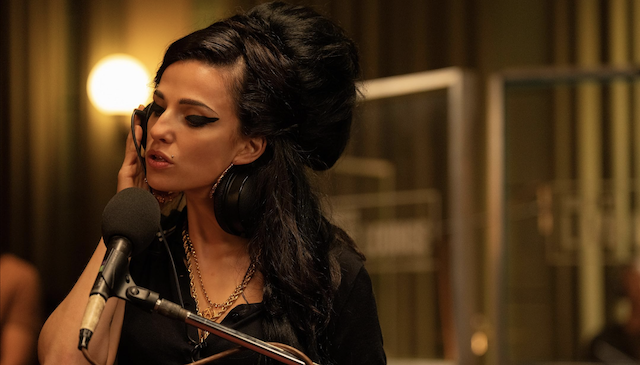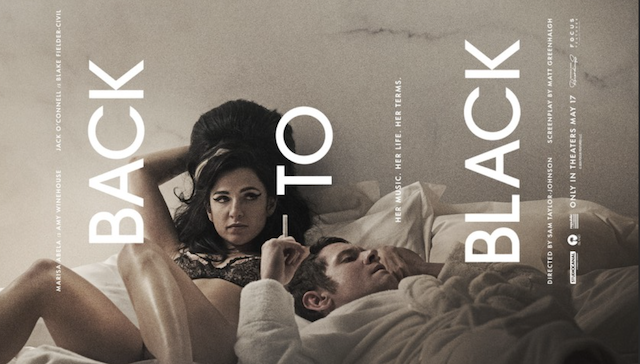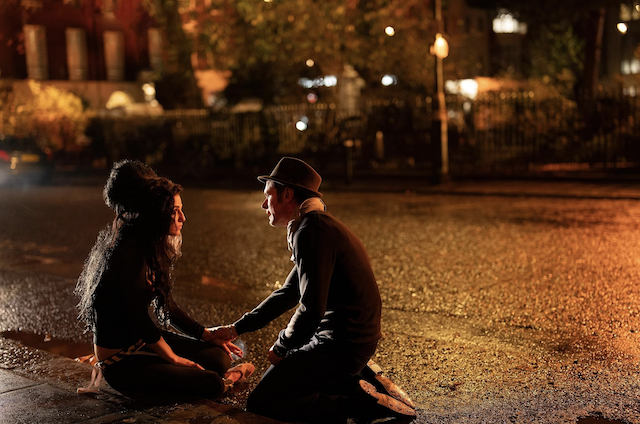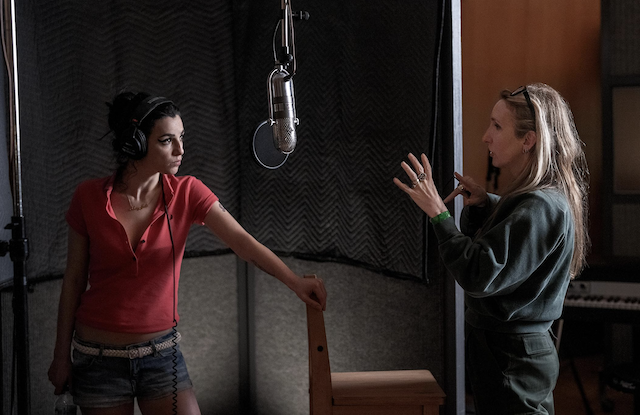
Photo by Courtesy of Dean Rogers/Focus Fe/Courtesy of Dean Rogers/Focus F – © 2024 Focus Features, LLC.
The explosive lives of famously troubled but equally gifted artists are often embraced by their industries for one thing: their ability to sell their work for their representatives’ financial gain. Amy Winehouse was one such talented musician whose fiery personal life, including her confident, impulsive attitude and equally fragile ego, was often times used to advance professional achievements. Her emotional journey is presented in the new empowering biopic about her life, Back to Black.
The film emotionally chronicles her fight to maintain control over how she was depicted in the media, particularly when it came to her addictions. The drama thrives in telling her story from her perspective, which ultimately humanizes her increasing troubles while she recorded the eponymous album.
Back to Black reunites director Sam Taylor-Johnson with screenwriter Matt Greenhalgh. The duo previously collaborated on the helmer’s directorial debut, the 2009 British biographical drama Nowhere Boy, which chronicles John Lennon’s teenage years.
Back to Black begins chronicling Amy in her relatively polite youth, as she’s on the verge of signing a deal with Island Records to record her debut studio album, 2003’s Frank. She’s a teenager from the Camden district of London, who’s devoted to her Nan Cynthia (Lesley Manville), a former 1950s nightclub singer.

©Courtesy of Focus Features
While her friends and family view her as a nice Jewish girl, Amy still possesses a drive to share her natural talent beyond being an up-and-coming sensation in the London nightclub scene. She’s supported by her doting father, Mitch (Eddie Marsan), who’s separated from her mother, with whom she still lives with, despite her growing success.
Amy’s talent and lack of boundaries that fuels her art captures the attention of Nick Shymansky (Sam Buchanan). He becomes interested in becoming her manager after she performs her song Stronger Than Me, which becomes her debut single from Frank, as it calls her boyfriend’s masculinity into question. The tune showcases that the musician isn’t afraid to embrace her self-indulgent self-expressions, including drinking to getting tattoos on a whim.
But when Amy meets with the executives from Island Records, they make suggestions on how to make her more marketable in the U.S., as they feel Frank wasn’t very commercial. They suggest waiting to release her follow-up record in America, and that she should stop playing the guitar onstage.
But the songwriter informs them that she needs to lead her life the way she wants in order to be inspired to pen songs. So she decides to take a major break before she records her next album, the 2006 eponymous record, while ultimately became her last LP.
While she later visits a pub, Amy meets the man who she declared was the love of her life, the seemingly invincible Blake Fielder-Civil (Jack O’Connell). The singer and confident video production assistant mutually seduce each other after he proves that he has memorized her album.
Despite Blake’s suave nature, his penchant for drugs, and the fact that he leaves his girlfriend to date Amy, makes his growing relationship with the latter become increasingly toxic. Their aggressive chemistry leads them to end their relationship after he leaves one of her shows in the middle of a song because he’d rather do drugs than listen to her.
In order to contend with her grief, Amy writes and records the tunes for her album Back to Black. Upon hearing the song, Blake becomes convinced that the record’s message of melancholy means that she wants to reunite, and they ultimately get married.
However, soon after the wedding, the duo’s seeming happiness is put to the test. They’re faced with the realities and consequences that their addictions have not only on themselves, but also each other.

Photo by Courtesy of Dean Rogers/Focus Fe/Courtesy of Dean Rogers/Focus F – © 2024 Focus Features, LLC.
With Winehouse being one of the world’s most recognizable recording artists in the late 2000s, both for her singing and songwriting abilities and the struggles in her personal life, Abela brilliantly personified the musician’s drive to succeed in achieving her goals. The actress’ close studying of the singer’s vocals and physicality provided a staggering emotional effect as she recreated the tracks during in-concert renditions on screen.
The actress’ reiteration of the musician’s live performance of her most famous single, Rehab, at the 2008 Grammy Awards is perfection. Abela, who was best known for starring on the British television series Industry and COBRA before landing her breakout film role in Back to Black, embodied Winehouse the most during such performance scenes. The actress did all her own singing, and captured all of the singer’s nuanced vocals and struts on stage, particularly during the Rehab performance.
Abela’s performance on screen was aided by the drama’s costume designer, PC Williams, and makeup and hair designer, Peta Dunstall. The duo infused the protagonist’s outfits, especially her signature beehive, winged eyeliner and ballet flats, in the way she saw them.
Each outfit reflects the state of mind Winehouse was in throughout her ever-evolving career. Williams outfitted Abela in the real pink cardigan the musician wore when she first met Fielder-Civil, which represents her optimism about their romance.
Another key look the costume designer secured for the movie was the Dolce & Gabbana dress and Louis Vuitton Winehouse wore during her 2008 Grammys performance. The Italian fashion house created the dress on spec for the biopic, while the French fashion house remade her shoes. The outfit infused the performance with a glamorous sense of authenticity that celebrates her career’s crowning achievement.
Dunstall’s stellar hair design also added to the accuracy of Winehouse look throughout the film. Under Taylor-Johnson’s guidance of not using a full wig, particularly for the musician’s beehive. Instead, the hair designer added halos, stick-ins and fringe clips to Abela’s real hair to create the full volume of the singer’s signature style.
Abela gives a sympathetic and charismatic portrayal of the assured but vulnerable Winehouse, in both her emotional trajectory and nuanced vocal performance, in Back to Black. The drama thrives in telling the musician’s story from her perspective, which aided in humanizing the obstacles she was forced to face while she recorded the eponymous album.
The actress’ performance, combined with Williams and Dunstall’s costume and makeup and hair designs, make Back to Black the pinnacle musical biopic about an artist who was determined to share her life story on her own terms.

Photo by Courtesy of Dean Rogers/Focus Fe/Courtesy of Dean Rogers/Focus F – © 2023 Focus Features, LLC.
Focus Features will release Back to Black in U.S. theaters this Friday, May 17.
Grade: B+
If you liked this article, please share your comment below.
Check out more of Karen Benardello’s articles.
Here’s the trailer of the film.

